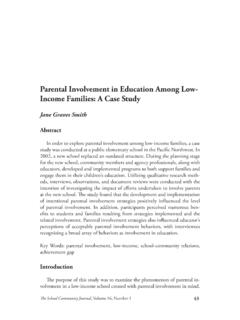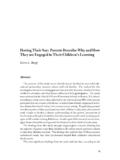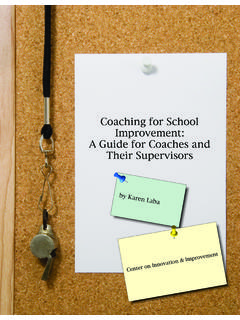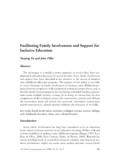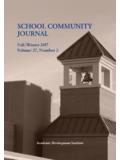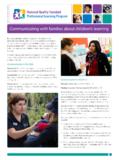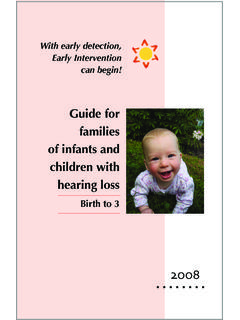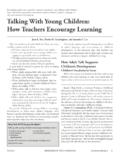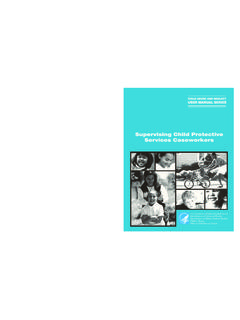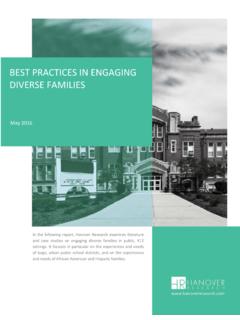Transcription of Communicating with Families Across Cultures: An ...
1 The School Community Journal, 2007, Vol. 17, No. 2 Communicating with Families Across Cultures: An Investigation of Teacher Perceptions and Practices Jody L. Eberly, Arti Joshi, and Jean KonzalAbstractIncreasing diversity in the student population intensifies the need for and the difficulties of establishing culturally sensitive and meaningful commu-nication between teachers and parents. This study examined the practices of early childhood and elementary teachers concerning culturally sensitive home-school communication.
2 As a second phase of a multi-phase research design, focus group discussions were conducted with 21 participants. Discussions cen-tered on the teachers understanding of familial influences on learning and their actual communication patterns with parents. Seven themes were identified re-lated to such issues as: defining culture ; exploring the relationship between culture , class, and child-rearing; recognizing one s own biases; and reaching out to parents in a culturally sensitive manner. Implications for educators working with Families from diverse cultures are Words: home-school communication, culturally responsive teaching, fo-cus groups, teacher-parent relationshipIntroduction Their culture is what they learn at home.
3 The labels are supposed to make things easier, but they don t. They make it much more difficult. THE SCHOOL COMMUNITY JOURNAL There are cultures within cultures because of different wants and needs individuals may have for themselves. They may act different from the way that they were taught within their culture . They may want to step outside of their culture . Scholars today recognize that culture is influenced by variables such as his-torical and social contexts, geographic location, gender, age, and generation, as well as ethnicity, cultural community, and race (Greenfield, 1994; Gutierrez & Rogoff, 2003).
4 The educators quoted above are struggling to understand this intricate construct in the context of their own classrooms. They are doing so because as teachers in New Jersey, with a large multiethnic population, they are challenged daily with building relationships Across cultural boundaries. They are, in Lisa Delpit s words, teaching other people s children (1995). Research in the field of home-school relations recognizes that children are ed-ucated in the home and the community as well as in the school; therefore, open and trusting communication between teachers and parents is critical (Dodd & Konzal, 2002).
5 When faced with the challenge of working with Families from cultures different from their own, teachers must work especially hard to avoid misunderstandings based in cultural differences. When Families and educators can communicate openly, there is a better chance that this will lead to increased social capital, which then leads to common understandings and expectations about the best ways to help children learn. This, in turn, leads to better stu-dent outcomes (Coleman & Hoffer, 1987). Additionally, the literature shows that when parents understand the school culture and provide at-home experi-ences to support school expectations, children learn more (Henderson & Berla, 1996; Henderson & Mapp, 2002).
6 Close relationships between Families and educators are built on mutual trust and respect. Developing such a relationship is difficult under any circumstanc-es; it is even more problematic to establish when parents and teachers come from different backgrounds. However, open, honest, and reciprocal cultural exchanges can take place when educators assume their professional respon-sibility to reach out to parents in thoughtful and respectful ways. Doing so helps both parents and teachers understand each other s values and beliefs so that each can create learning environments, at home and at school respective-ly, that recognize the knowledge and practices of the other system.
7 Research conducted by Trumbull, Rothstein-Fisch, and Hernandez (2003) reiterates the importance of teachers understanding and respecting the orientations of the Families in order to support students learning. Communicating Across CULTURES Theoretical Framework and Literature ReviewThe broad foundation for the study is the ecological framework as pro-posed by Bronfenbrenner (1979, 1986), which identifies multiple interlocking and nested variables that influence the development of children. Based on this framework, in the present study, Families and schools are conceptualized as components of the microsystem, the relationship between the family and school comprise the mesosystem, and cultural notions of development form the macrosystem.
8 Children are raised within this overlapping set of systems, and therefore open communication between the mesolinks is imperative if children are to grow and learn. Other theorists also argue for the importance of teachers and educators actively listening to each other in order for each to gain understandings of the different systems that affect the child (Atkin & Bastiani, 1988; Dodd & Konzal, 2002; Sarason, 1995; Thompson, 2003); in Bronfen-brenner s words, the scholars emphasize the need to strengthen the mesolink between the microsytstems of home and school.
9 Atkin and Bastiani argue that listening to to be seen as a crucial element in any attempt to improve home/school can make schools aware of the Families of their pupils and of the communities in which they are located (p. 18). In their concluding chapter, Dodd and Konzal (2002) argue that since no one knows everything or has all the answers, everyone needs to work together to find bet-ter ways to educate children. And everyone has knowledge to contribute to this ongoing process (p. 290). Additionally, the model of developmental niche articulated by Super and Harkness (1997, 2002) helps to frame the current study.
10 This model concep-tualizes development of children in a cultural context where the parents (or caregivers ) beliefs about child-rearing and development, or ethnotheories, are seen as the pathway through which development is fostered. Development is conceptualized as operating within the subsystems of the physical and social settings, the culture and customs of child-rearing, and the caretakers ethnothe-ories which are shared by the community. In the current study, we examine the extent to which teachers, as constituents of the child s community, understand and share the parents culturally embedded ethnotheories.

